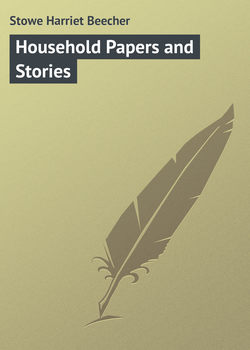Читать книгу Household Papers and Stories - Гарриет Бичер-Стоу, Stowe Harriet Beecher, K. McDowell Rice - Страница 1
ОглавлениеINTRODUCTORY NOTE
Mrs. Stowe had early and very practical acquaintance with the art of housekeeping. It strikes one at first as a little incongruous that an author who devoted her great powers to stirring the conscience of a nation should from time to time, and at one period especially, give her mind to the ordering of family life, but a moment’s consideration will show that the same woman was earnestly at the bottom of each effort. In a letter to the late Lord Denman, written in 1853, Mrs. Stowe, speaking of Uncle Tom’s Cabin, said: “I wrote what I did because, as a woman, as a mother, I was oppressed and heartbroken with the sorrows and injustice which I saw, and because, as a Christian, I felt the dishonor to Christianity.” Not under the stress of passionate emotion, yet largely from a sense of real responsibility as a woman, a mother, and a Christian, she occupied herself with those concerns of every-day life which so distinctly appeal to a woman’s mind. How to order a household, how to administer that little kingdom over which a woman rules, and, above all, how to make family life stable, pure, and conservative of the highest happiness, these were the questions which she asked herself constantly, and which she tried to solve, not only incidentally in her fiction, but directly in her essays, and in that field of one tenth fiction and nine tenths didacticism, which constitutes most of the present volume.
A Scholar’s Adventures in the Country and Trials of a Housekeeper appeared in the miscellany to which she gave the name of The Mayflower, and reflect humorously the Cincinnati experiences which again are playfully recounted in letters published in her son’s Life. The former, contributed in 1850 to The National Era, was drawn pretty closely from the experiments of Professor Stowe. It is noticeable that in this paper and in Our Second Girl, which was contributed to The Atlantic Monthly for January, 1868, the author poses as the masculine member of the household, as if this assumption gave her some advantage in the point of view. At any rate, she adopted the same rôle when she came more deliberately to survey a wide field in a series of articles.
The House and Home Papers were contributed first to The Atlantic Monthly, and afterward published in book form as the production of one Christopher Crowfield, though there was not the slightest attempt otherwise at disguising the authorship. The immediate occasion of the papers was no doubt the removal of the Stowes from Andover and their establishment in Hartford, an event which took place shortly before the papers began to appear in The Atlantic. The years which followed during the first Hartford residence saw also a marriage in the family and new problems of daily life constantly presenting themselves, so that a similar series appeared in the same magazine, purporting to be from the same householder, entitled The Chimney Corner. This series, indeed, entered rather more seriously into questions of social morality, and deepened in feeling as it proceeded. The eleventh section is a warm appreciation of the woman who figured so largely in Mrs. Stowe’s early life, and the last two papers rose, as the reader will see, to the height of national memories. Mrs. Fields has preserved for us, in her Days with Mrs. Stowe, a striking record of the mingling of the great and the near in this writer’s mind. The period of which she writes is that in which The Chimney Corner series was drawing to a close: —
“In the autumn of 1864 she wrote: ‘I feel I need to write in these days, to keep me from thinking of things that make me dizzy and blind, and fill my eyes with tears, so that I cannot see the paper. I mean such things as are being done where our heroes are dying as Shaw died. It is not wise that all our literature should run in a rut cut through our hearts and red with our blood. I feel the need of a little gentle household merriment and talk of common things, to indulge which I have devised the following.’
“Notwithstanding her view of the need, and her skillfully devised plans to meet it, she soon sent another epistle, showing how impossible it was to stem the current of her thought: —
“‘November 29, 1864.
“‘My dear Friend, —
“‘I have sent my New Year’s article, the result of one of those peculiar experiences which sometimes occur to us writers. I had planned an article, gay, sprightly, wholly domestic; but as I began and sketched the pleasant home and quiet fireside, an irresistible impulse wrote for me what followed, – an offering of sympathy to the suffering and agonized, whose homes have forever been darkened. Many causes united at once to force on me this vision, from which generally I shrink, but which sometimes will not be denied, – will make itself felt.
“‘Just before I went to New York two of my earliest and most intimate friends lost their oldest sons, captains and majors, – splendid fellows physically and morally, beautiful, brave, religious, uniting the courage of soldiers to the faith of martyrs, – and when I went to Brooklyn it seemed as if I were hearing some such thing almost every day; and Henry, in his profession as minister, has so many letters full of imploring anguish, the cry of hearts breaking that ask help of him.’”…
